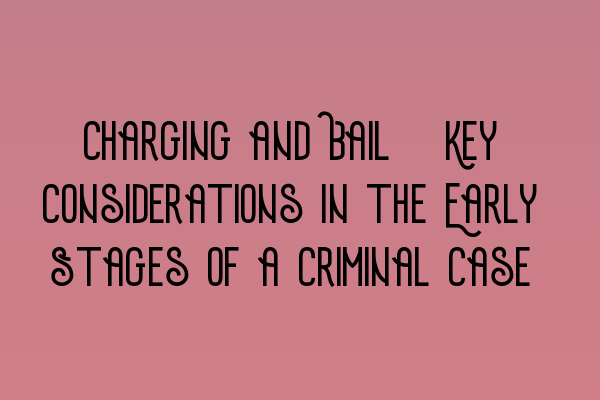Charging and Bail: Key Considerations in the Early Stages of a Criminal Case
Welcome to SQE Criminal Law & Practice Law UK! In this blog post, we will discuss the key considerations surrounding charging and bail in the early stages of a criminal case. Understanding these crucial aspects can greatly impact the outcome of a case, so it is essential for legal professionals to be well-versed in this area.
1. Charging: The Initial Step
The charging stage is the very first step in a criminal case. It involves the formal accusation of an individual by the prosecution for an alleged criminal offense. The decision to charge is typically made by the Crown Prosecution Service (CPS) based on the available evidence.
During the charging process, it is important to consider several factors. Firstly, the evidence against the accused must be carefully analyzed to determine the strength of the case. This assessment involves reviewing witness statements, forensic evidence, and any other relevant information that may support the charges.
Furthermore, legal professionals must consider the specific legislation applicable to the alleged offense. Familiarity with the relevant statutes and case law is crucial in order to assess the viability of the charges and to provide effective legal advice to the client.
If you would like to test your knowledge of criminal law and practice, we recommend exploring our SQE 1 Practice Exam Questions and practicing with our SQE 1 Practice Mocks FLK1 FLK2.
2. Bail: Preserving Freedom
Bail refers to the conditional release of an accused person pending trial. It is a fundamental right aimed at ensuring that individuals are not unjustly imprisoned before their guilt is proven beyond a reasonable doubt.
When considering bail, courts examine multiple factors. Firstly, the seriousness of the alleged offense plays a crucial role. For more serious offenses, such as violent crimes, the court may be less inclined to grant bail due to concerns about the safety of the public.
Additionally, courts consider the likelihood of the accused fleeing or interfering with the administration of justice. Factors such as the accused’s ties to the community, employment status, and past criminal record may influence the decision regarding bail.
It is important for legal practitioners to present a compelling argument to the court on behalf of their clients to secure bail whenever possible. This involves demonstrating the accused’s ties to the community, their strong character references, and their commitment to attending court proceedings.
If you are preparing for the SQE 2 exam, our comprehensive SQE 2 Preparation Courses can provide you with the necessary knowledge and skills to excel in this area of law.
3. The Role of the Solicitor
The solicitor plays a pivotal role in the early stages of a criminal case. They are responsible for gathering and reviewing evidence, advising clients on the strength of the case against them, and making representations on behalf of their clients during court hearings.
Additionally, solicitors are responsible for preparing bail applications and advocating for their clients’ release. They must carefully consider the factors mentioned earlier to build a strong argument in favor of granting bail.
Furthermore, solicitors must communicate effectively with their clients throughout the process, explaining the charges, the potential consequences, and the available legal options. This ensures that clients are fully informed and can make informed decisions regarding their defense.
At SQE Criminal Law & Practice Law UK, we offer comprehensive SQE 1 Preparation Courses to equip aspiring solicitors with the necessary knowledge and skills to navigate the complexities of criminal law.
Conclusion
In conclusion, charging and bail are key considerations in the early stages of a criminal case. Legal professionals must meticulously assess the evidence, familiarize themselves with the applicable legislation, and provide effective representation to their clients. By understanding these crucial aspects, solicitors can navigate the complexities of criminal law and secure the best possible outcome for their clients.
For more information about the SQE exams and important dates, please refer to the SRA SQE Exam Dates provided on our website.
